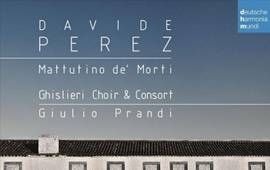> Vote the best classical album of 2014

Davide Perez - Mattutino de Morti, CD review, on 15th October, 2014
If you would like to vote for this cd please vote HERE
There are some interpreters’ albums in which a certain vision stirs our admiration. There are complete works , famous composers , different generations, schools and conceptions that outline the landmark of certain parts of this kind of literature. It is argued whether the musician was good or not. It is then compared with other versions. Or, as it is the case of this album, Davide Perez, it gets discovered – a name, a work, an age – of transition in this case, as the Italian born in Naples, in Pergolesi’s generation, was part of a particular longevity line, by dying in Lisbon in the year when Mozart composed Symphony no. 31, Paris.
An album released in 2014 – Mattutino de' Morti by Davide Perez, in a fundamental interpretation – Ghislieri Choir and Consort, conducted by Giulio Prandi along with the soprano Roberta Invernizzi and the bass Salvo Vitale, as soloists. It is an album through which one of the 18th century’ masterpieces is returned to us alongwith this name enlisted in the gallery of the creators of Opera Seria and sacred music, that is brought back to our attention.
Dedicated to those gone, Mattutino de' Morti is an oratorio for soloists, choir and orchestra – luxuriant, like the royal ceremonies. It symbolizes, even in this case, the ideas of greatness and brilliance; just like other similar pages signed by Davide Perez, it creates a bridge between the Baroque and the Classicism; it brings here the concertato style and some features borrowed from the operatic works. It was kept in the repertory since 1770, the year of its first appearance, until the end of the 19th century. After a break longer than a century, it was interpreted in 2013, by the Ghislieri Choir and Consort in France, Italy, Holland and at the "George Enescu" International Festival in Bucharest, during the nightly concerts at the Romanian Athenaeum.
Translated by Ana-Maria Țone and Elena Daniela Radu
MTTLC, The University of Bucharest














